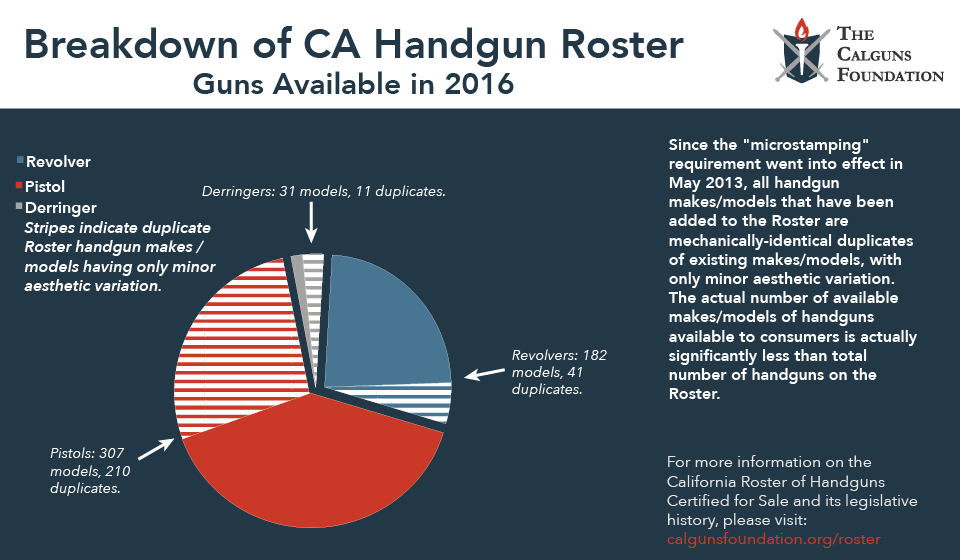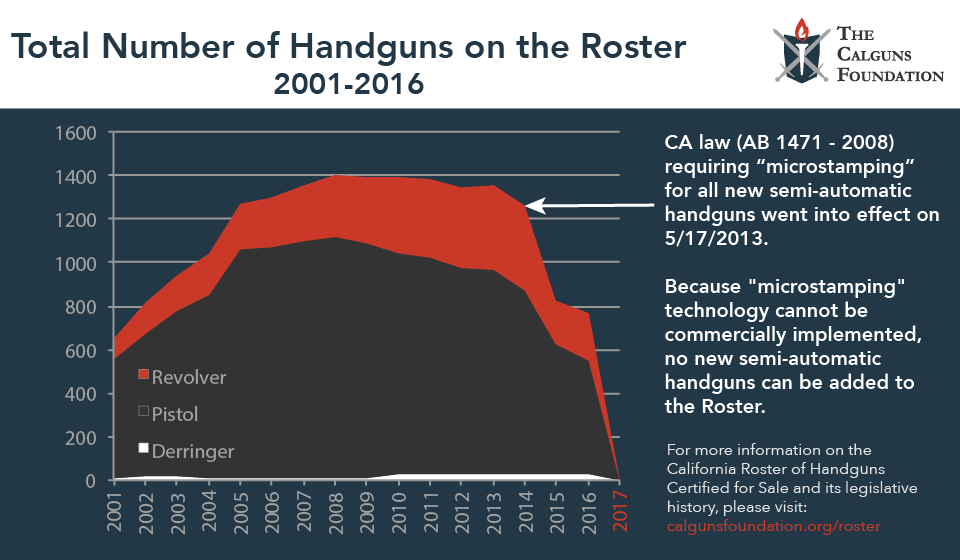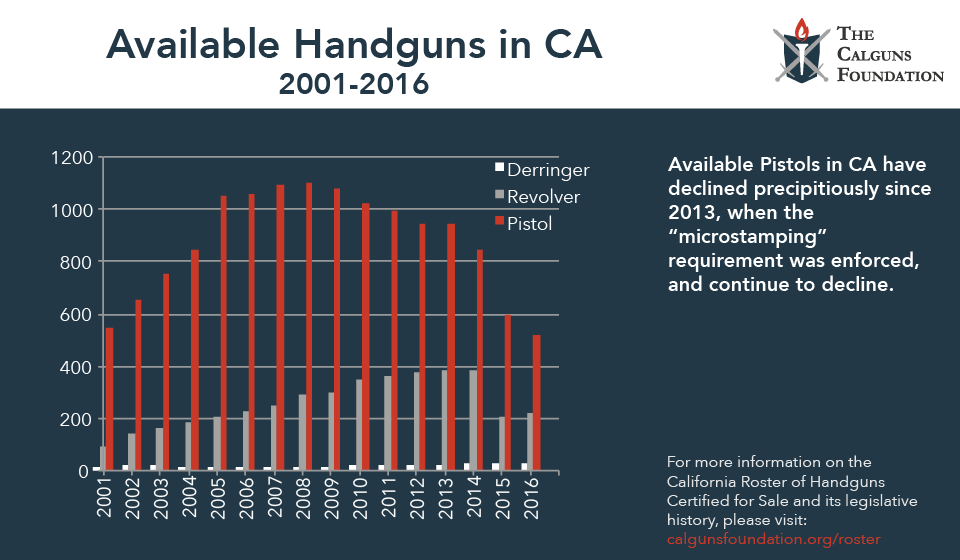Hopefully, this page about the California DOJ’s handgun Roster and “microstamping” requirement is helpful to understanding the history of the law, the state of the Roster itself, and our legal action challenging California’s unconstitutional Roster laws.
If there’s something you’d like to see included in this page, please do send us a message and let us know!
HISTORY OF THE CALIFORNIA HANDGUN ROSTER / MICROSTAMPING
1/1/2001: CA laws (SB 15 – 2000) creating a Roster of “not unsafe” handguns certified for sale are enforced.
1/1/2006: CA law (SB 489 – 2003) requiring loaded chamber indicator or magazine disconnect for all new semi-automatic centerfire handguns added to Roster is enforced; CA law (SB 489 – 2003) requiring magazine disconnect for all new rimfire semi-handguns added to Roster enforced.
1/1/2007: CA law (SB 489 – 2003) requiring both loaded chamber indicator and magazine disconnect for all new semi-automatic centerfire handguns added to Roster enforced.
4/30/2009: The Calguns Foundation and 5 other plaintiffs (including the Second Amendment Foundation) filed a federal Second Amendment civil rights lawsuit called Peña v. Cid (now captioned Peña v. Lindley) against the California Department of Justice that challenged the constitutionality of the state’s “Handgun Roster” laws. (The lawsuit was later amended to challenge the “microstamping” requirement after Attorney General Kamala Harris put that part of the law into effect. See below.)
5/17/2013: CA law (AB 1471 – 2008) requiring “microstamping” for all semi-automatic handguns to be added to Roster enforced by CA Attorney General Kamala Harris (CA DOJ).
BACKGROUND ON LEGAL ACTION CHALLENGING THE ROSTER
Summary: Second Amendment and Fourteenth Amendment civil rights challenge to California DOJ’s Handgun Roster laws and “microstamping” requirement.
Plaintiffs: The Calguns Foundation; Second Amendment Foundation; Ivan Peña; Roy Vargas; Doña Croston; Brett Thomas
Defendant: Defendant Stephen Lindley is the Chief of the California Department of Justice Bureau of Firearms
Litigation Counsel: Alan Gura; Donald Kilmer; Jason Davis
Peña, et al. v. Lindley is a federal Second Amendment and Fourteenth Amendment civil rights lawsuit challenging California DOJ’s Handgun Roster laws and “microstamping” requirement.
We argue, among other things, that the Roster and related regulatory scheme is a de facto ban on handguns in common use for lawful purposes.
Some readers and CGF supporters might know that we filed this federal civil rights lawsuit against the California Department of Justice and Attorney general during a very brief window of time in 2009 when the Second Amendment applied to (was “incorporated” against) California through the Fourteenth Amendment in a 9th Circuit opinion called Nordyke v. King.
(We also took advantage of that “incorporation” window to file the first-ever Second Amendment challenge to California’s “may issue” carry license policies by the respective sheriffs of Sacramento and Yolo counties.)
Nordyke and Peña were, in effect, put on hold when the Supreme Court decided to take up McDonald v. Chicago. But, after Alan Gura prevailed in that landmark case, this lawsuit could move forward.
Importantly, Penal Code Section 31910(b)(7)(A) establishes the “microstamping” requirement. That section states:
Commencing January 1, 2010, for all semiautomatic pistols that are not already listed on the roster pursuant to Section 32015, it is not designed and equipped with a microscopic array of characters that identify the make, model, and serial number of the pistol, etched or otherwise imprinted in two or more places on the interior surface or internal working parts of the pistol, and that are transferred by imprinting on each cartridge case when the firearm is fired, provided that the Department of Justice certifies that the technology used to create the imprint is available to more than one manufacturer unencumbered by any patent restrictions.
The “microstamping” laws were supposed to go into effect in 2010. But because Todd Lizotte (a private engineer) held the patent for “microstamping”, the State couldn’t enforce the law because it was “encumbered”.
And we actually prevented Attorney General Kamala Harris from implementing the “microstamping” requirement for years by keeping the patent from lapsing and going into the public domain.
As the New York Times reported in 2012,
In California, legislation signed by Gov. Arnold Schwarzenegger in 2007 has been held up while the attorney general’s office makes sure the technology is unencumbered by patents, as the microstamping law requires.
A gun rights group, the Calguns Foundation, went so far as to pay a $555 fee to extend a lapsing patent held by the developer to further delay the law from taking effect.
“It was a lot cheaper to keep the patent in force than to litigate over the issues,” said Gene Hoffman, the chairman of the foundation, adding that he believed the law amounted to a gun ban in California.
Eventually, in 2013, Lizotte and Harris figured out how to get the technology “unencumbered by any patent restrictions” and, on May 17, certified the “microstamping” technology and began to enforce the requirement.
So, in June 2013, we filed the Second Amended Complaint in Peña v. Lindley, adding the Attorney General’s enforcement of the “microstamping” requirement to the lawsuit.
On February 25, 2015 – almost six years after we filed the case – Federal District Court Judge Kimberly Mueller ruled for the State of California, saying that “The [Unsafe Handgun Act] does not burden plaintiffs’ Second Amendment rights.”
That same day, we appealed that awful decision to the 9th Circuit.
On July 20, 2015, we filed our Opening Brief, and on October 29, 2015, we filed our Reply Brief; at that point, the appeal was fully briefed and pending oral arguments before a 3-judge panel, after which it could be submitted for a decision.
The Ninth Circuit heard arguments in Peña v. Lindley on March 16, 2017; attorney Alan Gura argued for CGF and the other plaintiffs. Some highlights of this hearing are in the YouTube video below:
THE ROSTER TODAY
As we have before, we asked the DOJ for a copy of their Roster database, and in response, they sent us a speadsheet export having a data date of September 21, 2016.
We evaluated their Roster data and discovered some interesting facts.
For example, while there were 517 active semi-automatic handgun (“pistol”) models on the Roster as of the data date, nearly half of those listed models (210) were simply aesthetic variations of other listed handgun models.
So, in essence, there really were only 307 semi-automatic handgun types available on the Roster for law-abiding people to buy.
Take a look at three graphical representations of the DOJ Roster data we created to visually show the state of the Roster:
One question we are often asked is, “Why does everything look like it’s going to ‘zero out’ at the beginning of the year?“
The answer is that, a few years ago, the Legislature passed SB 363 (2013, Wright) and changed Penal Code Section 32015 such that, “Commencing January 1, 2015, the annual [Roster] fee shall be paid on January 1, or the next business day, of every year.”
So, all handgun models must be renewed at the same time at the beginning of every year (or they could be dropped from the Roster).
As you can see, the Roster is – overall – at its lowest point in history. And that’s especially true for the semi-automatic handguns and revolvers.
In Heller, the Supreme Court noted that “the American people have considered the handgun to be the quintessential self-defense weapon.”
If that’s true, and we believe it is, then all law-abiding people should be able to acquire safe, modern handguns (like, for instance, a Glock Model 17 Gen 4) that are in common use by private citizens and and law enforcement across the United States.
We will press forward in Peña, et al. v. Lindley and, with your support, make every effort to strike down this gun ban once and for all.
Please consider chipping in a tax-deductible donation using the form below to help fund our Second Amendment lawsuit Peña v. Lindley and strike down the Roster gun ban.



